Items
Tag is exactly
experience
-
2020-04-11
A story under the pandemic
The sudden outbreak of the epidemic in 2019 caused me to experience many more firsts in my life: my first online class, the first time I needed to wear a mask when I went out, the first time I had to take my temperature to be sterilized when I went to the doctor, and the first time I graduated high school in quarantine. In just a few short months, the outbreak spread across multiple countries turning into a global resistance, with new cases and even deaths increasing every day. Schools were closed and students were told to stay home. When I saw these real and ever-growing numbers, it was not easy to feel good. But after all, I was just watching the data on my cell phone refreshing, in fact, I have not really felt the seriousness of this virus. Until I saw a video: a girl's father because infected with the virus, due to the development of too fast, the father in just a few days time passed away, the girl looked at her father's funeral car drove away, which really found that the father is really gone, never come back, the girl through the mask towards the police on duty at the roadside disappointed and helpless shouted out a sentence: I have no father! That was the first time I felt the horror of this virus. In addition to my automatic daily tracking of the latest progress of the case, social media was flooded with all sorts of bad news about the outbreak, including how it was spreading, the misery and agonizing struggles of the infected and their families, and so on. I was so worried about myself or my family members and friends being infected that I was constantly urging the elderly members of my family not to go out, so as not to be infected. At the same time, the frantic buying of masks, goggles, sterilizing alcohol, and so on, by many people was increasing the fear of the disease. As a result of the epidemic, I know that many people are suffering from mental health problems such as insomnia or anxiety. I am one of them. -
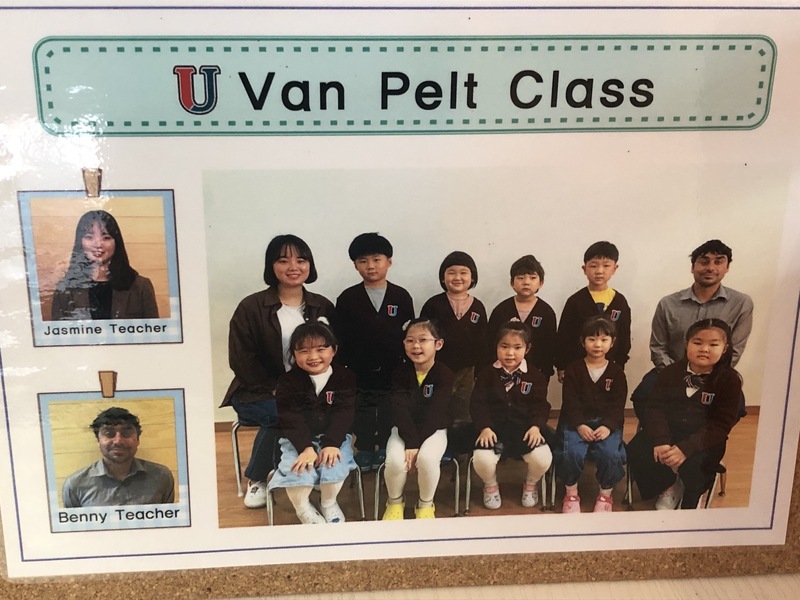 2022-03
2022-03Teaching in Korea
During the height of the pandemic I began to think deeply about what i wanted to do if things ever got "Back to normal." I'd spent my entire life in San Jose California, and decided I wanted to get out and do something different. In early 2021 I went through the process of becoming certified to teach English abroad. I was eventually hired by an English academy in South Korea for a one year contract in the fall of 2021. I enjoyed it so much I ended up re-upping for another year. When I arrived I had to quarantine for one week, and my school director (essentially a principal) picked me up from my quarantine facility and brought me to my apartment, paid for by the school as part of my contract. It was an exciting adventure for me slowly adapting to a new culture and learning to navigate the country of South Korea. The attitude towards COVID was much more serious than in the U.S. The outdoor mask mandate was in force until Spring of 2022, and the indoor mandate was not lifted until January of 2023. Even coming from California, one of the U.S. states with stricter restrictions, it was an adjustment. It certainly wasn't a political issue here in South Korea. I can only speak very rudimentary Korean, but from what I could tell, nobody seemed to have a problem following government health advice. It was illuminating to see how different countries citizens can have radically different views to a crisis based on culture, beliefs, values and attitudes towards Science. Many people still choose to wear masks in public places now in the Summer of 2023. Given the tensions with the North, there is a heavy U.S. military presence in South Korea, which made it easier to connect with other English speakers and get a taste of home near the military bases. I even met my lovely partner here, a space force member stationed in the same city I teach and live in. Being shut in is what drove me to get out of my comfort zone and I'm truly glad for my experience over the past two years in Korea. I've met friends from different countries, experienced aspects of Korean culture that I love, and also have had my privilege checked by aspects of living in Korea that I'm not as fond of. I am excited to go back home this fall, but I hope to carry all I've learned about culture and life in Korea with me. In a strange way, I'm glad that at least the pandemic made me think about what I wanted to do and see once I had the freedom to explore, and I can't say enough how grateful I am for the travel I've been able to do. -
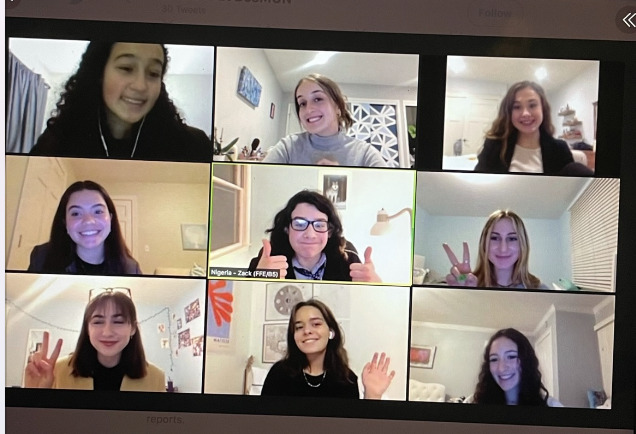 2021-02-06
2021-02-06Model UN in the time of a Pandemic
I uploaded a screenshot of my Model UN conference that had to be conducted over Zoom during the COVID-19 pandemic. In a normal year, a Model UN conference would take place at a large event space, usually a university or a hotel. Model UN teams from high schools across the globe participate in the conferences that my school attends. Unfortunately, I did not get to have this unique experience during the pandemic year. Instead, my school took part in an online form of the conference via zoom and discord, through Boston University. Although it was not the same, I was fortunate to have the opportunity to meet plenty of interesting people from all over the world! This screenshot shows the "bloc" (or alliance) that I had formed with students representing countries such as Mexico, Nigeria, and Russia. I can be seen in the middle box on the right, representing the nation of Afghanistan! -
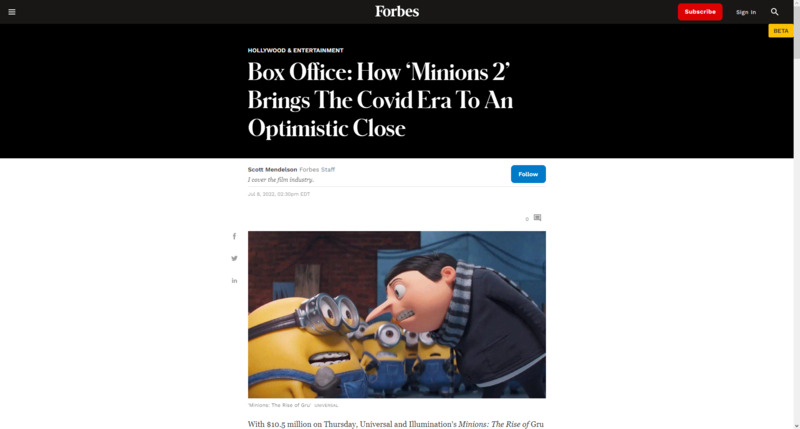 2022-07-08
2022-07-08Box Office: How ‘Minions 2’ Brings The Covid Era To An Optimistic Close
This is a news story from Forbes by Scott Mendelson. This is an article that discusses the moviegoing habits of people pre and post-COVID. The article mentions that Minions: The Rise of Gru and Top Gun: Maverick were meant to come out in 2020, but they were delayed because of COVID. Due to the high amounts of attendance to both films, the author is speculating that audience members that may have forgone streaming new movies are coming back to theaters. The box office gross for both films has broken records. Given my own experience of going to the movies recently since COVID began, I noticed that even though I did see signs about masks, it was never enforced, and restrictions were pretty much non-existent. I delayed going to the theaters in-person partly due to not finding many new releases interesting enough, in addition to not wanting to deal with masks while watching. I think that less restrictions make the experience more appealing now than during COVID, as movie tickets have been getting more expensive over the years. In can be hard to justify the steep prices with the restrictions in place that could make it less comfortable. My own experience that I had made it feel like it was the pre-COVID era, and that made it something I enjoyed. I think that given the snacks people eat at theaters, it would have been cumbersome to have to take the mask off and put it on again with eating. If I had to do that, I probably would not have wanted to get any snacks with those restrictions in place, and theaters generally make more revenue from refreshments than they do showing the movie itself. I think that the author is right that the high gross of both films mean that the "summer movie" is returning to what it once was, with audiences that may have been lost during COVID coming back. -
2022-06-10
Lockdown Experience
What’s it like living in lockdown? Everyday felt like a cycle, especially online school. You wake up: -Turn your laptop on -Eat -Sleep - Defecate and repeat No leisure activities on the weekends, like we used to have. You're separated from socialisation, family, and friends. So you start to try new hobbies. Or instead, rot in your hobbit hole (bedroom). If I'm being real, I spent my lockdown in a big t-shirt and walking around in my underwear. Skateparks were closed so I skated in my driveway and neighbourhood. All my neighbours could hear was the slamming of my board, and ahhhh. I eventually switched to skating in my garage, and then just stopped skating as a whole. I tried writing screenplays, which were terrible. Lockdown was separation from people to people contact, boredom, weight gain, and extremely long screen time. I’m glad it’s over, but I definitely learned a little bit about myself. The fact that everyone else was in lockdown made it a lot more doable. -
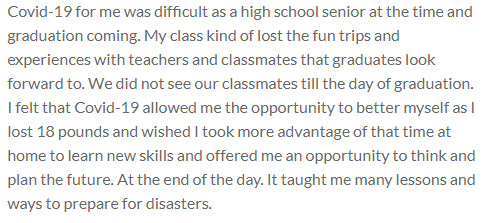 2020-05-01
2020-05-01Taking advantange of a bad situation.
Covid-19 for me was difficult as a high school senior at the time and graduation coming. My class kind of lost the fun trips and experiences with teachers and classmates that graduates look forward to. We did not see our classmates till the day of graduation. I felt that Covid-19 allowed me the opportunity to better myself as I lost 18 pounds and wished I took more advantage of that time at home to learn new skills and offered me an opportunity to think and plan the future. At the end of the day. It taught me many lessons and ways to prepare for disasters. -
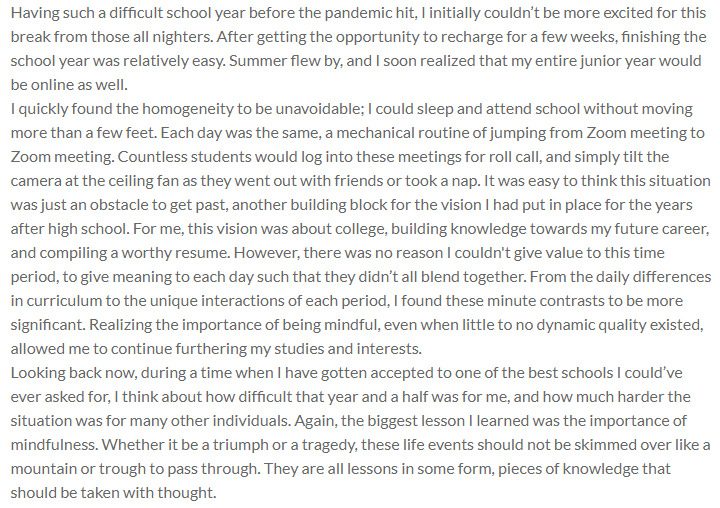 2022-05-20
2022-05-20Online School Problems
Having such a difficult school year before the pandemic hit, I initially couldn’t be more excited for this break from those all nighters. After getting the opportunity to recharge for a few weeks, finishing the school year was relatively easy. Summer flew by, and I soon realized that my entire junior year would be online as well. I quickly found the homogeneity to be unavoidable; I could sleep and attend school without moving more than a few feet. Each day was the same, a mechanical routine of jumping from Zoom meeting to Zoom meeting. Countless students would log into these meetings for roll call, and simply tilt the camera at the ceiling fan as they went out with friends or took a nap. It was easy to think this situation was just an obstacle to get past, another building block for the vision I had put in place for the years after high school. For me, this vision was about college, building knowledge towards my future career, and compiling a worthy resume. However, there was no reason I couldn't give value to this time period, to give meaning to each day such that they didn’t all blend together. From the daily differences in curriculum to the unique interactions of each period, I found these minute contrasts to be more significant. Realizing the importance of being mindful, even when little to no dynamic quality existed, allowed me to continue furthering my studies and interests. Looking back now, during a time when I have gotten accepted to one of the best schools I could’ve ever asked for, I think about how difficult that year and a half was for me, and how much harder the situation was for many other individuals. Again, the biggest lesson I learned was the importance of mindfulness. Whether it be a triumph or a tragedy, these life events should not be skimmed over like a mountain or trough to pass through. They are all lessons in some form, pieces of knowledge that should be taken with thought. -
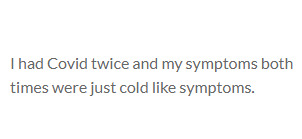 2022-04-10
2022-04-10My Expirence with Covid-19
I had Covid twice and my symptoms both times were just cold like symptoms. -
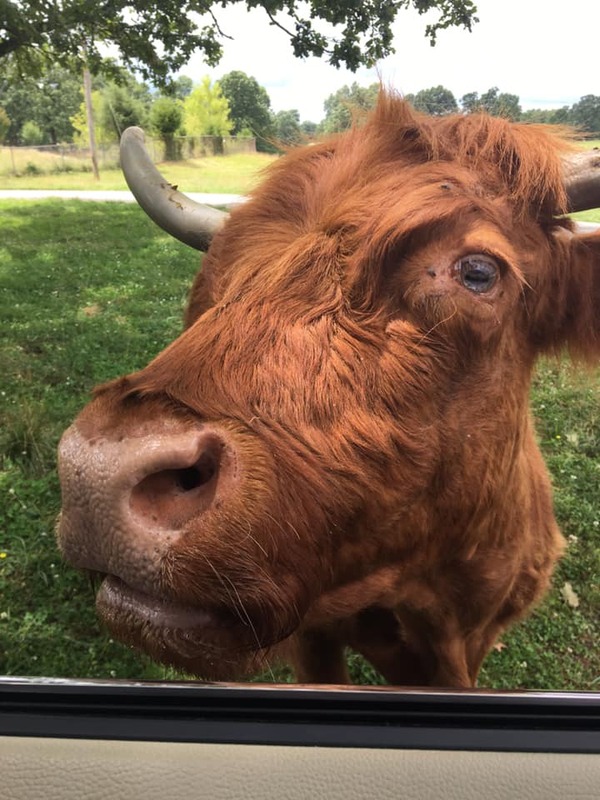 2021-07-11
2021-07-11Wild Ride at the Safari Park
Over the past few years, the COVID pandemic has become a pretty lonely time for me living in Missouri, where I am originally from. I moved out to Arizona over five years ago and have not left. When the pandemic hit, my job moved to be online for a while, and therefore I made the trip to go back home and be with my family. We realized that we became increasingly stir-crazy through the pandemic by staying in the house all of the time. There was no more travel to the restaurants, shopping, and entertainment places. The past summer, with the pandemic on a decline, my family and extended members traveled to the Wild Animal Safari park. There was my Aunt Pat, my Niece, Morgan, my mother Robyn, and myself in the car as we traveled an hour away to enjoy the safari animals. The great thing about the excursion is that we did not have to get out of the car to remain safe during the pandemic. We received our animal food at the entrance and then proceeded through the park. It was one of the best times of the year because I am not sure I have laughed so hard in my life. I had no idea animals had that long tongues that they would stick in the car windows to get the food pellets. It was delightful seeing my niece squirm around in the car as she tried to get away from the animals. It was one of the best times during the pandemic, and I cannot recommend this excursion or something similar. -
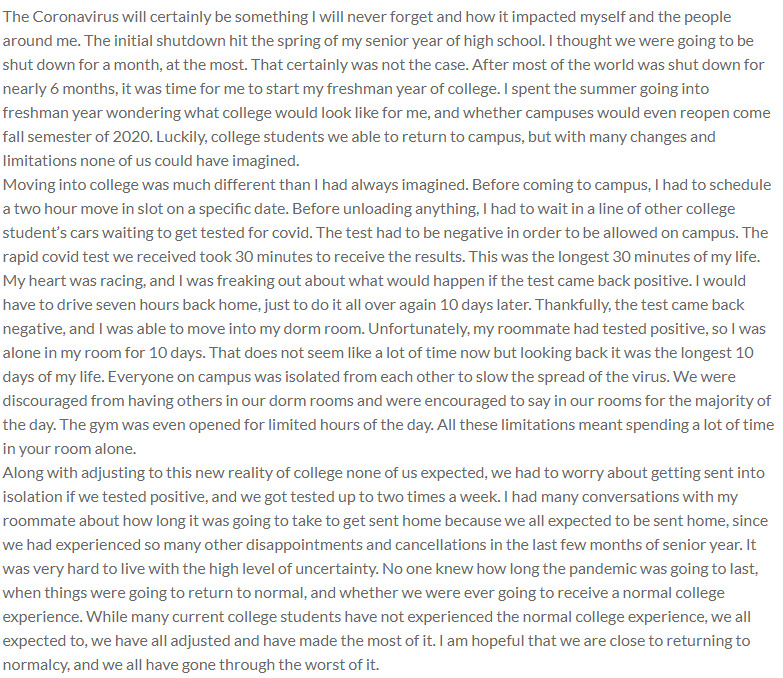 2020-08
2020-08Covid-19 Freshman
The Coronavirus will certainly be something I will never forget and how it impacted myself and the people around me. The initial shutdown hit the spring of my senior year of high school. I thought we were going to be shut down for a month, at the most. That certainly was not the case. After most of the world was shut down for nearly 6 months, it was time for me to start my freshman year of college. I spent the summer going into freshman year wondering what college would look like for me, and whether campuses would even reopen come fall semester of 2020. Luckily, college students we able to return to campus, but with many changes and limitations none of us could have imagined. Moving into college was much different than I had always imagined. Before coming to campus, I had to schedule a two hour move in slot on a specific date. Before unloading anything, I had to wait in a line of other college student’s cars waiting to get tested for covid. The test had to be negative in order to be allowed on campus. The rapid covid test we received took 30 minutes to receive the results. This was the longest 30 minutes of my life. My heart was racing, and I was freaking out about what would happen if the test came back positive. I would have to drive seven hours back home, just to do it all over again 10 days later. Thankfully, the test came back negative, and I was able to move into my dorm room. Unfortunately, my roommate had tested positive, so I was alone in my room for 10 days. That does not seem like a lot of time now but looking back it was the longest 10 days of my life. Everyone on campus was isolated from each other to slow the spread of the virus. We were discouraged from having others in our dorm rooms and were encouraged to say in our rooms for the majority of the day. The gym was even opened for limited hours of the day. All these limitations meant spending a lot of time in your room alone. Along with adjusting to this new reality of college none of us expected, we had to worry about getting sent into isolation if we tested positive, and we got tested up to two times a week. I had many conversations with my roommate about how long it was going to take to get sent home because we all expected to be sent home, since we had experienced so many other disappointments and cancellations in the last few months of senior year. It was very hard to live with the high level of uncertainty. No one knew how long the pandemic was going to last, when things were going to return to normal, and whether we were ever going to receive a normal college experience. While many current college students have not experienced the normal college experience, we all expected to, we have all adjusted and have made the most of it. I am hopeful that we are close to returning to normalcy, and we all have gone through the worst of it. -
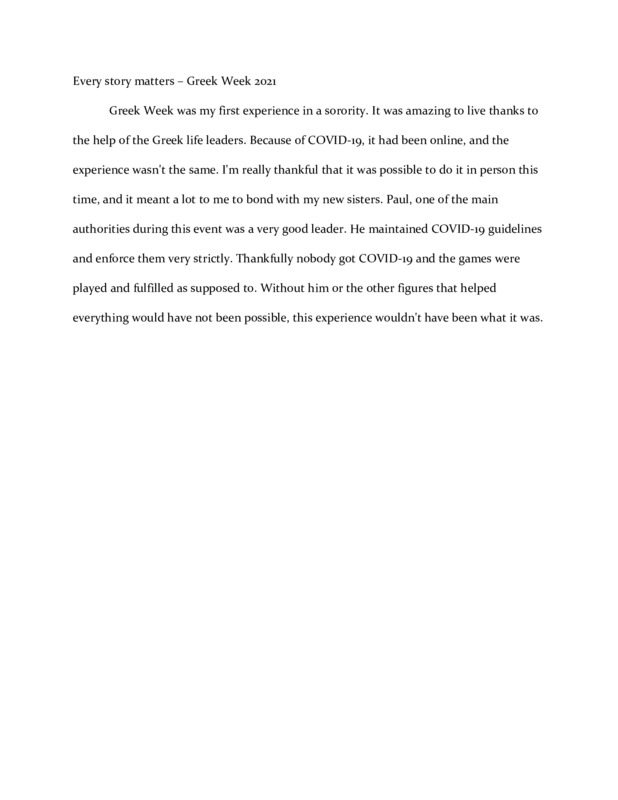 2021-10-22
2021-10-22Every story matters – Greek Week 2021
Greek Week was my first experience in a sorority. It was amazing to live thanks to the help of the Greek life leaders. Because of COVID-19, it had been online, and the experience wasn't the same. I'm really thankful that it was possible to do it in person this time, and it meant a lot to me to bond with my new sisters. Paul, one of the main authorities during this event was a very good leader. He maintained COVID-19 guidelines and enforce them very strictly. Thankfully nobody got COVID-19 and the games were played and fulfilled as supposed to. Without him or the other figures that helped everything would have not been possible, this experience wouldn't have been what it was. -
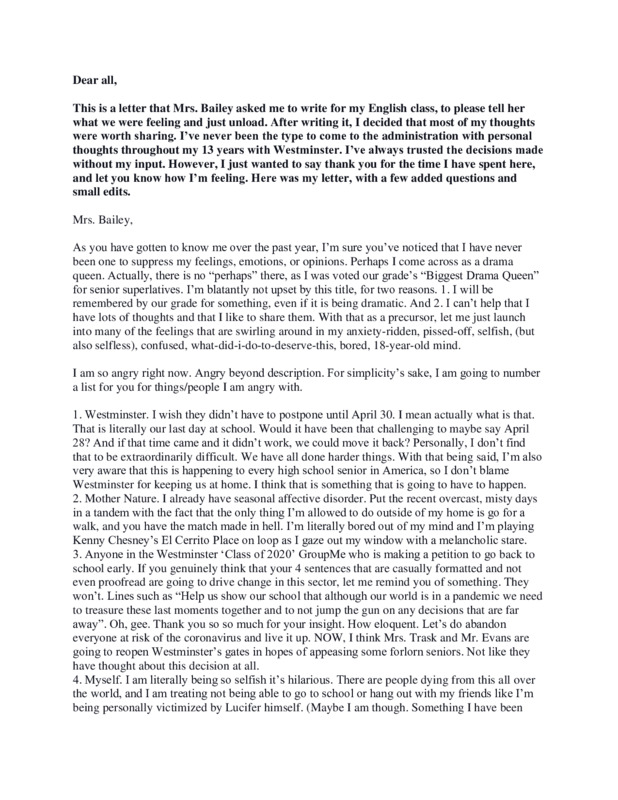 2020-03
2020-03A thank you, and a few questions
I attached a letter I wrote to my senior year English teacher and forwarded to the administration after my high school canceled the rest of my in-person school year in March 2020. When reading it, the reader should specifically acknowledge the timeline and therefore lack of information surrounding the pandemic, as well as the personal memories incorporated. This letter houses pent-up frustration, unfiltered emotion, and a lack of education surrounding the pandemic. As an 18-year-old who just lost the remainder of her senior year, I cater to selfish and emotional tendencies. The reader should recognize that I composed this letter before the CDC, scientists, and government disseminated lots of information and education about the virus, so it embodies the unawareness and confusion that surrounded the pandemic. Aside from that context, the reader should acknowledge the remembrances incorporated into the letter – through imagery and specific quotes, my memories and mourning become more internalized. Clearly, these images and memories can only be understood by members of the high school class or close peers. However, these details such as “alter ego outfit”, “alpha omega day”, and “mudslide” speak to personal experience during the pandemic and allow for my specific outlook. The letter I wrote bears lots of significance on my experience during the pandemic by allowing me closure and unleashed emotion. As a senior in high school when the pandemic hit, I never received closure with teachers, classmates, sports teams, etc. This letter gave some semblance of finality with my school’s administration and allowed me to express my concerns in an unfiltered fashion. Although reading the letter itself a year and a half later allows me to reflect on my emotions, the experience of actually writing the letter will never leave me either. I sat at my laptop, brainstorming what to write for an English busy-work assignment. I found it difficult to care about school anymore, after I had committed to Vanderbilt, and school moved to zoom. But, quickly, putting my feelings to paper resulted in an outpouring of passion, both positive and negative, and I cried, not sure why. Rereading the letter, as embarrassed as I am about my trivial concerns, I still return to the place of uncertainty, anger, and volatility. Even though I expressed lots of shallow ideas, the letter still bears relevance to me, as I’m proud of my honesty and vulnerability during that time. -
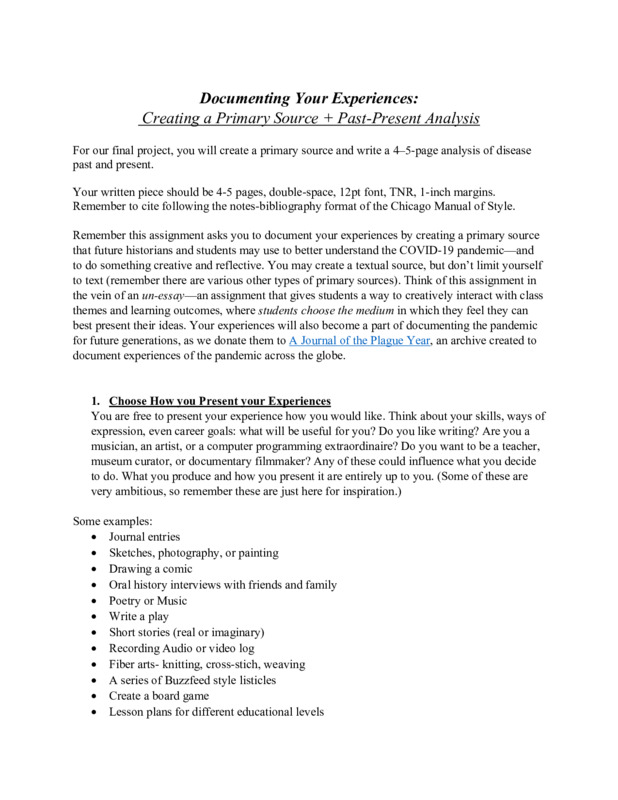 2020-12
2020-12HIST 301 California State University Channel Islands lesson plan
Lesson plan for HIST 301 students of California State University Channel Islands, taught by Hanni Jalil -
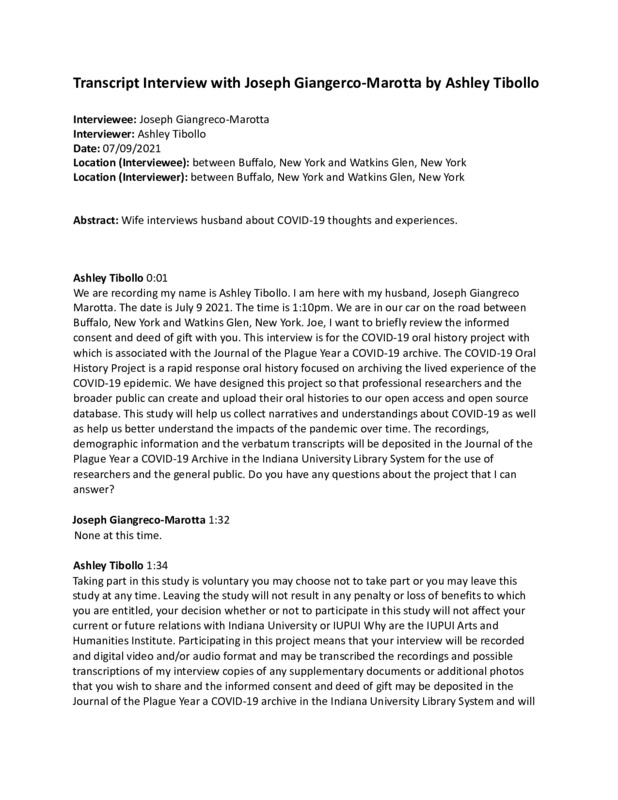 07/09/2021
07/09/2021Joseph Giangreco-Marotta Oral History, 2021/07/09
Wife interviews husband about COVID-19 experience. -
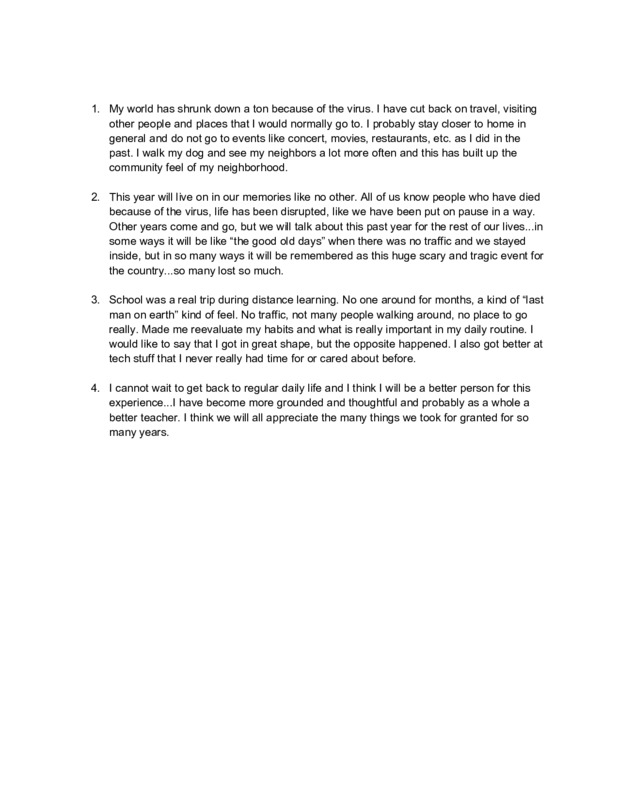 2021-05-18
2021-05-18COVID-19: A Year to Remember
This upload involving interviewing one of my highschool teachers a series of questions involving their experience during COVID-19 is intended to display how this pandemic has affected the lives of other people and how they have coped with the time spent adjusting to these new conditions. I myself find this aspect of learning from another person and their experience of these grand pandemic important as it allows others, myself included, to experience a different point of view towards a situation which ended up effecting nearly everyone across the globe in order to compare and contrast how others may have adapted to a new life style. -
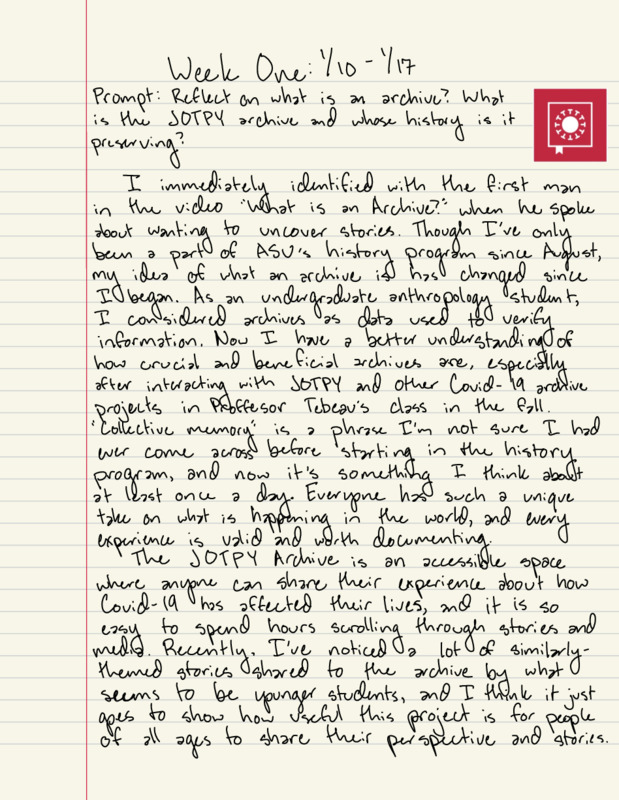 2021-04-25
2021-04-25Julia Jensen Portfolio
Going into this internship, I really didn’t know what to expect. Throughout undergrad, I worked full time jobs and did not have the time to take on any internships or research positions, so this was my first experience with it. I also was studying anthropology and was uncertain what path I wanted to take, making it hard to find internships that felt applicable to my future. Once I decided to study history with a goal of pursuing a public history career, this internship seemed like an incredible opportunity to learn more about the field and get a feel for what a possible future career could be. Thanks to the Public History Methodology course taught by Dr. Mark Tebeau, I did have a decent amount of knowledge of what public history consisted of, which made it clearer to me what I wanted to pursue and gave me an understanding on which I could build throughout this internship. Working with JOTPY provided hands-on experience in which I could apply this knowledge and learn the applicable skills necessary to practice public history. These skills included managing metadata, conducting and transcribing oral histories, marketing new collections, prioritizing the safety and privacy of contributors, learning to work with a team remotely, and acknowledging and confronting the silences present in the archive. As I continue to volunteer with JOTPY past the end of my internship, I hope to strengthen these skills, growing more comfortable with curating so that I may carry that with me once I move on from this archive. Given that this was my first experience like this, much of the work I did was initially out of my comfort zone. The scope of this archive was a bit intimidating, and I did not initially understand how important and impactful JOTPY is and will continue to be, even past the pandemic. As the weeks went on, I grew more comfortable curating, as well as interacting with the team over Slack and Zoom, which I hadn’t utilized very much before this internship. I was also unfamiliar with marketing something like a collection, so having the opportunity to do so pushed me past my comfort zone and taught me how to better write for a public audience in a way that is both succinct and engaging. I learned that I really enjoy this type of work, particularly when it came to creating a collection, as it gave me the opportunity to address a silence and advocate for an underappreciated group of people while pulling from personal experience and situations that I have observed. My goal in life is to help people, and this was a great opportunity to help in a more subtle, behind-the-scenes sort of way. Since I had already hoped to pursue a career in the field of public history, specifically working with museums, this internship did not necessarily change my approach; however, it did strengthen my desire to work in this field, and taught me the necessary skills to feel confident that this is the right path for me. -
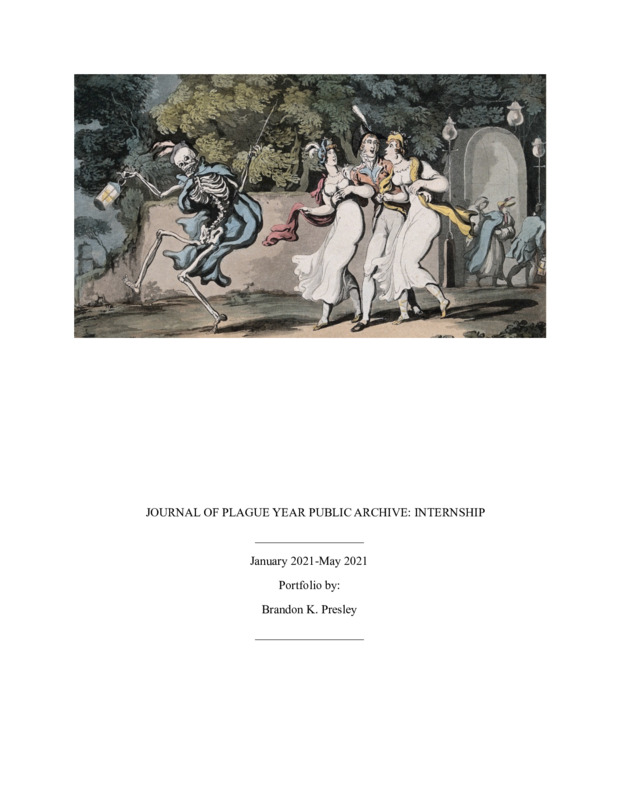 2021-04-24
2021-04-24JOTPY Internship Portfolio
This is my portfolio from my experience of working as an intern with the Journal of the Plague Year Public Archive. -
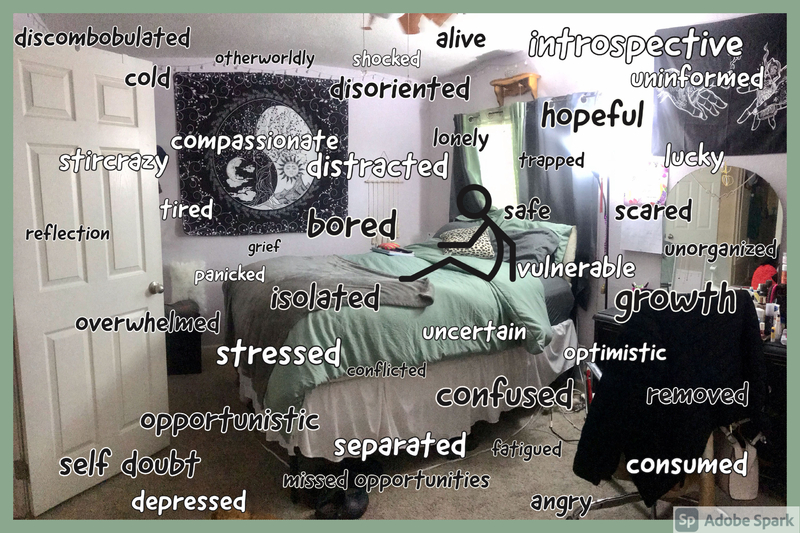 2021-04
2021-04How Covid 19 Made Me Feel
I created this image to visually represent my experience with covid-19. The goal is sharing my personal experience in hopes this reaches people who have felt the same. The coronavirus pandemic has affected people globally. Everything from anger to hopefulness, confusion to contentment can be used to describe experiences and feelings in regards to the pandemic as a whole. This foreign virus is historical, and will be in records as one of few other pandemics of this magnitude. This contribution to the archive is one of many attempting to provide an understanding for the future. -
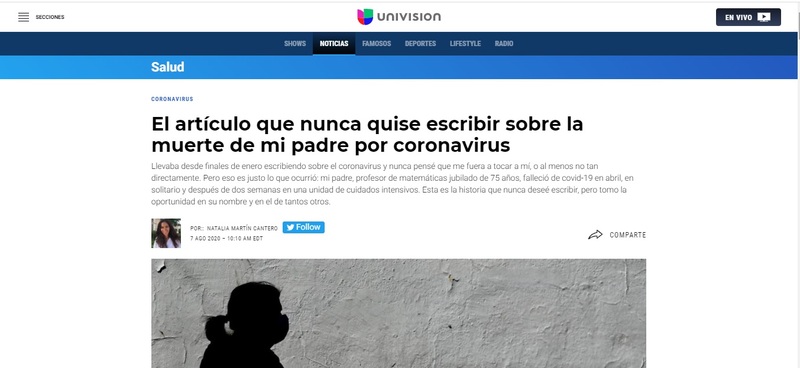 2020-08-07
2020-08-07El artículo que nunca quise escribir sobre la muerte de mi padre por coronavirus
Natalia Martin Cantero comparte su experiencia con el virus. Describe como llevaba meses ecribiendo de las experiencias de otros y nunca se imagino que estubiera escribiendo de su vida personal. Su padre callo enfermo en Enero, termino en cuidado intensivos y fallecio en Abril de complicaciones a los 75 años. Natalia Martin Cantero shares her experience with the virus. She describes how she spent months writing about others' experiences and never thought she would be writing about her personal life. Her father became ill in January, ended up in an intensive care unit, and passed away in April at the age of 75. -
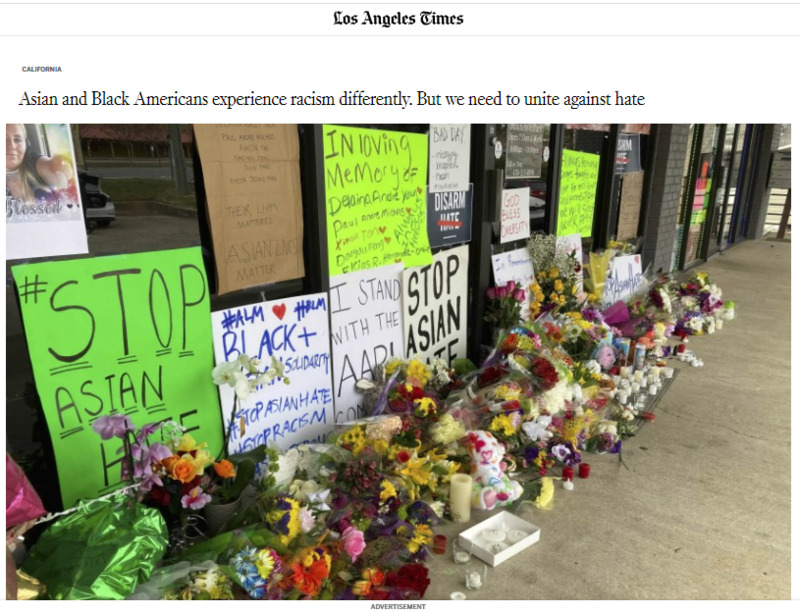 2021-03-23
2021-03-23"Asian and Black Americans experience racism differently. But we need to unite against hate"
In this editorial in the Los Angeles Times, Black female staff writer Sandy Banks poses the question "Now the question is: Can we join together and move forward, with white supremacy — not each other — as the enemy?" She reflects on the years of tension in Los Angeles between the Black and Asian American communities. However, she sees a common ground between the two communities in light of the anti-Asian racism and shooting of six Asian women at the hands of a White male, whose crimes were justified by a police spokesperson who was found later to have made anti-Asian social media posts. -
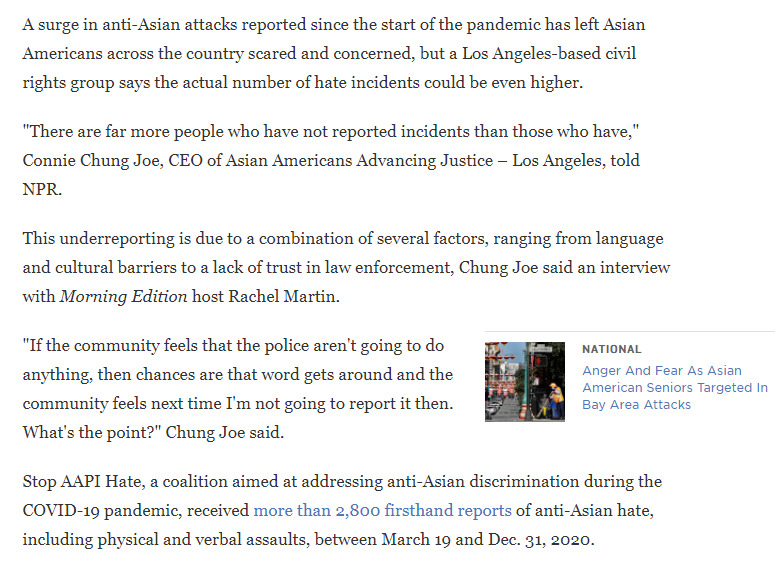 2021-03-11
2021-03-11Asian Americans Experience 'Far More' Hate Incidents Than Numbers Indicate
Stop AAPI Hate, a coalition aimed at addressing anti-Asian discrimination during the COVID-19 pandemic, received more than 2,800 firsthand reports of anti-Asian hate, including physical and verbal assaults, between March 19 and Dec. 31, 2020. However, as this article explains, many more go unreported due to obstacles such as cultural and language barriers and a distrust of law enforcement. The article also argues that the surge in assaults are partially rooted in the anti-Asian rhetoric of the previous presidential administration throughout the pandemic. -
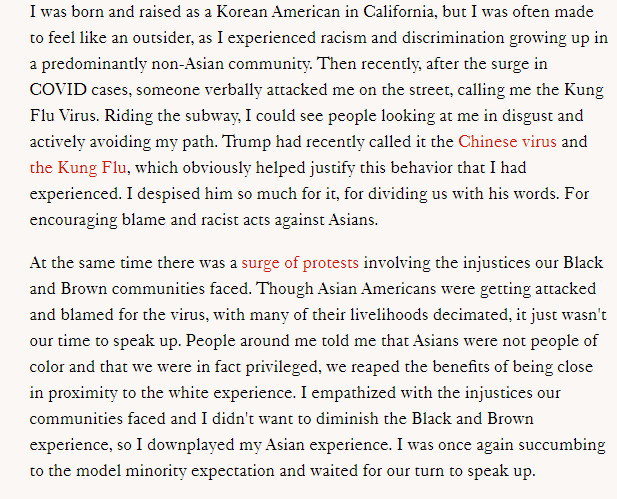 2021-02-14
2021-02-14"I'm Done Downplaying My Asian American Experience"
In response to the rise in anti-Asian racism and crimes, Allure magazine reached out to six prominent Asian Americans within the beauty industry to share their experiences as Asian Americans. They share not only accounts of bullying and racism, but also how the beauty industry can help change the narrative. -
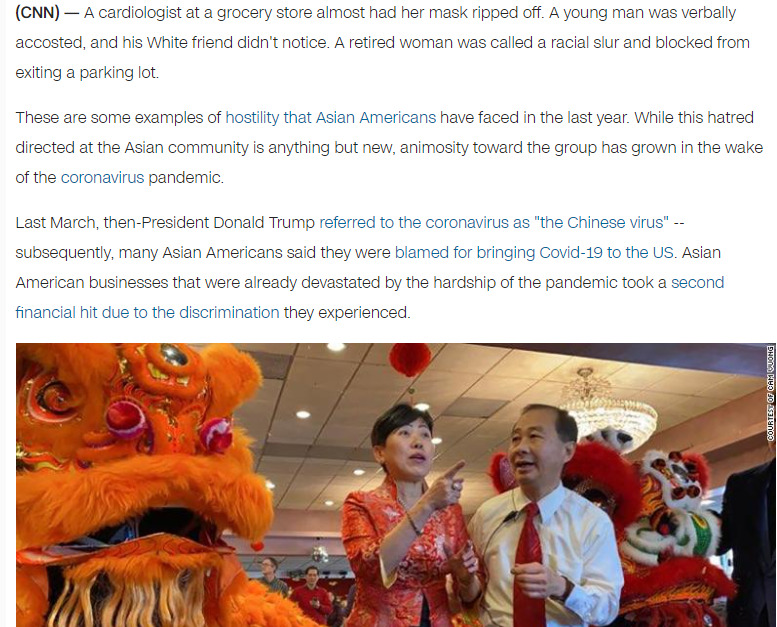 2021-03-19
2021-03-19Asian American Experiences With Hate
There were 3,795 firsthand complaints of racism and discrimination against Asian Americans from March 19, 2020, through the end of February 2021, according to the coalition Stop AAPI Hate. Last week, eight people -- six of whom were Asian women -- were killed in the Atlanta shootings at three spas. The incident shook up many in the Asian American and Pacific Islander (AAPI) community. While the past year has magnified the hate, it's also inspiring some Asian Americans to stop being silent and speak out about their experiences. CNN asked Asian Americans to share their stories. CNN received more than 300 responses, and this article shares some of these stories. They recount fear, violent attacks, racial slurs, losing businesses, being told to "go back to your country," and the scapegoating that has happened to the AAPI community. There is also a desire with the AAPI to speak out and encourage others to, too. -
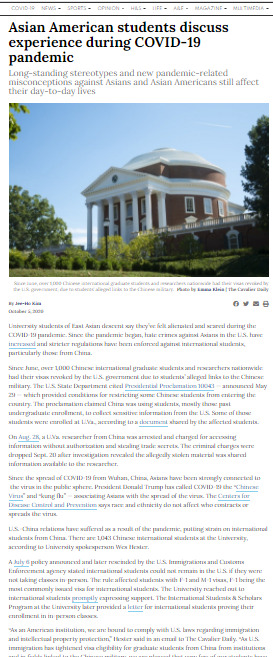 2020-10-05
2020-10-05Asian American students discuss experience during COVID-19 pandemic
Long-standing stereotypes and new pandemic-related misconceptions against Asians and Asian Americans still affect their day-to-day lives. University students of East Asian descent say they’ve felt alienated and scared during the COVID-19 pandemic. Since the pandemic began, hate crimes against Asians in the U.S. have increased and stricter regulations have been enforced against international students, particularly those from China. Since the spread of COVID-19 from Wuhan, China, Asians have been strongly connected to the virus in the public sphere. President Donald Trump has called COVID-19 the “Chinese Virus” and “kung flu” — associating Asians with the spread of the virus. -
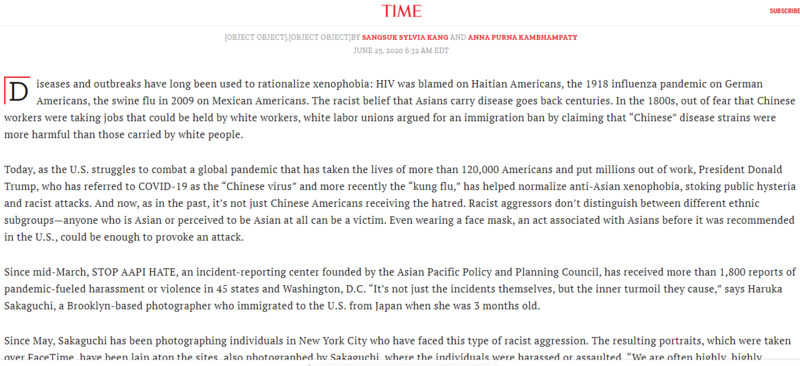 2020-06-25
2020-06-25'I Will Not Stand Silent.' 10 Asian Americans Reflect on Racism During the Pandemic and the Need for Equality
Asian Americans recount their experiences of the racism they face, being scapegoated as the cause of the virus. The aggression come in the forms of racial slurs, rude behavior, and physical violence. Many cite the rhetoric of Donald Trump and his insistence to refer to COVID-19 as the "Chinese flu" or "Kung flu" as justifying such behavior. These stories help illustrate the difficult experiences within the AAPI community. -
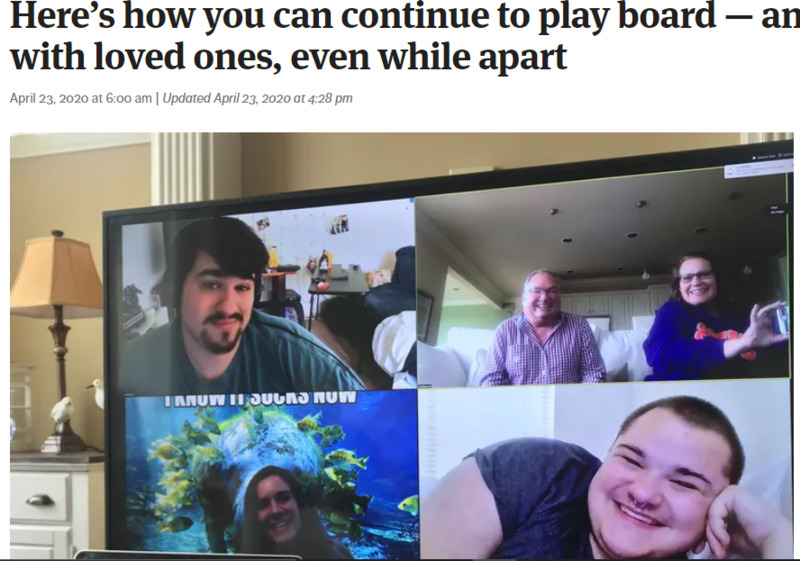 2020-05-11
2020-05-11Covid Threat
My dad was diagnosed with cancer in November of 2019 and it came as a shock to all off us. He started chemotherapy in February of 2020, and a as a result of his treatment his immune system was becoming weak. My dad continued to get better but the issue became about his immune system and covid. Covid-19 became a big issue for the United States in March so my family was very worried about getting sick for my dad since his immune system was getting weaker. As a result of this, my family and I did not go out and see other people CDC guidelines would be violated. This meant none of my siblings and I could ever truly hangout with our friends over the entire summer and Christmas break. Some people were violating Covid restrictions and stay at home orders, however, we could not because my family and I could not take the risk of getting my dad sick. While our friends were all hanging out we could not go because the risk wasn't worth the potential outcome of getting our dad sick. Even after some of the covid restrictions got lifted towards the end of 2020 I could still not go out because my dad could not get sick. This picture represents what me and my family would do since we could not hang out with our friends or extended family. We would play board games and would do trivia with our extended family. This was not ideal for me and my siblings because we wanted to hang out with our friends, but we knew we could not. Many families endured this over the course of this pandemic. Even just seeing your grandparents was hard to do because they are old and cannot get sick with covid. Many families including mine sacrificed seeing their other family because it was too big of a risk to see them and potentially get covid. This picture is an important representation of my covid experience because it brought me and my family closer together during a hard time. We spent a lot more time playing games and just hanging out with each other over the several months we were home from school. -
2021-01-15
my online school experience
Online school isn't that bad. I get to be in the comfort of my own home and away from probably sick kids. I feel better that way anyway. It's definitely easier too. I'm more focused at home surprisingly. I don't want to do it forever though. Maybe just for this year and then I can be a freshman. It's a good experience and others make it seem like it's the worst. It's kind of harder to learn but, that's only if you dont want to. When people tell me it's just as bad for me since its my last year of middle school, I definitely dont think so. I'm happy to leave and at least my last year of middle school is more interesting than others. -
2020
How I first Found out about the New Plague
I first found out about COVID was from my former science teacher. We had been talking about viruses and someone had mentioned the word "coronavirus" well all thought this would just be another virus that would just come and go. We were told that covid initially came from a snake in China and it would never travel to the US and we would be fine. Now my knowledge from what we learned I really don't trust any government with heir telling of the story because each one if different. This experience really has changed me and a person and who I really trust in many things. -
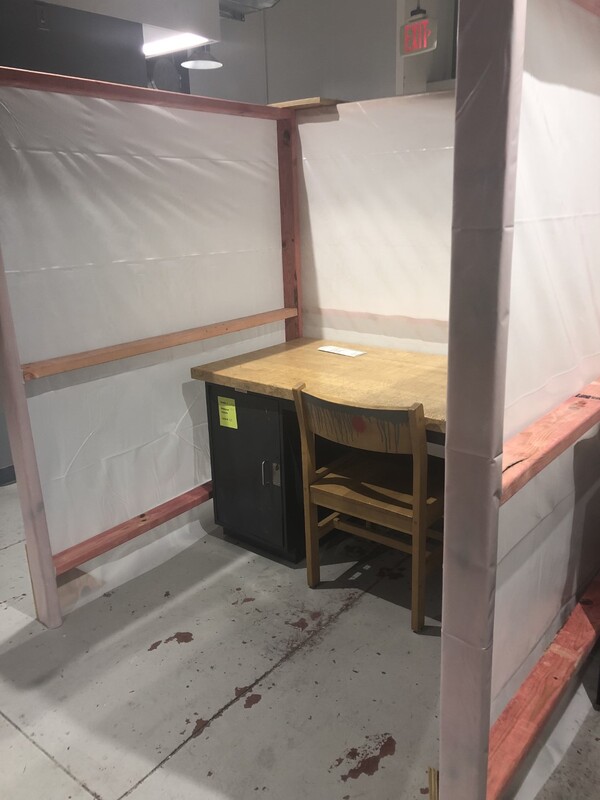 2020-11-16
2020-11-16Wentworth Institute of Technology - Architecture Studios
Covid-19 has put a severe dent into the learning ability of those studying for a design major here at Wentworth Institute of Technology. We as a collective group loved having the interactions within our studio space and sharing the ideas and progress of our projects. Being able to have in-person critiques of our projects with people coming from all over Boston just to show us how our project works or does not work. With the pandemic, this all has been lost due to us having to prevent the spread of Covid through walled-off workspaces. Don’t get me wrong, I want it out of our lives as much as the next guy, but also I don’t want to be paying an arm and a leg to be getting a second-rate education. The experience that we all received from an in-person studio is something that cannot be found over a Zoom call. Getting to see everyone's reactions to your final project is one of the greatest parts of becoming an architect. The freshman architecture student cannot get to experience that for their first year on campus and it deeply saddens me. On top of that, with Covid still playing such a heavy role within our lives, I don’t foresee anyone being able to have those in-person experiences any time soon. -
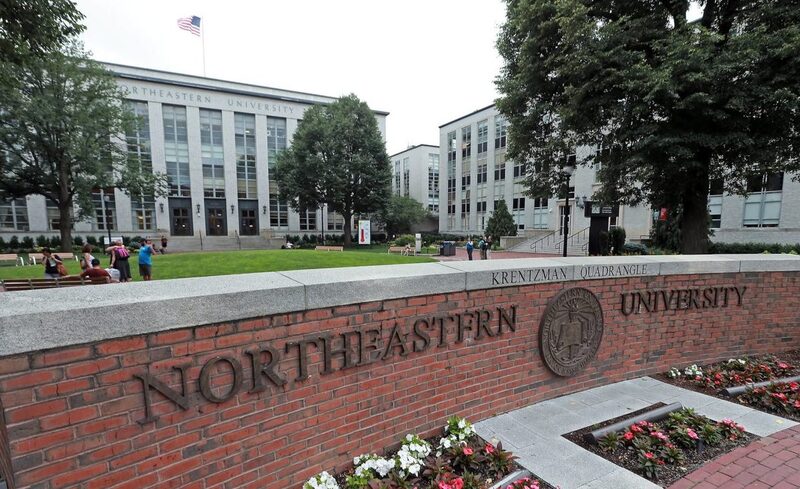 2020-11-18
2020-11-18Attending College in Boston During the Pandemic
I graduated high school in 2020 and decided to attend Northeastern University in Boston, MA. For my first semester I planned on traveling to London to study there through the NU.in program (program offered by Northeastern for alternate admission). Unforuntaly, once COVID ravaged through the world, we were no longer allowed to go to London. Instead, I decided to start my college career as a normal Northeastern student living in Boston. I think this experience is important to share because it gives one insight on what college life is like in a city school. Northeastern has very strict rules for obvious reasons, testing every 2-3 days, limited indoor gatherings, mask mandate on campus and much more. This is the safest way to go about this semester and it has allowed us to stay open, but if does hinder the college experience for students. It can be very hard to make friends in college and then on top of that, there is a pandemic which makes it hard to meet people under normal circumstances. Students voiced their concerns over this and got some rules to change (allowing a single guest per room, opening more meeting spaces, indoor dining etc). The school aspect is also very interesting, I think the majority of kids have 75% of their classes online, meaning learning through a zoom call/recorded video. Although it gets old quickly, learning online is a really good skill because it forced me to start taking learning into my own hands and be more independent with my work. However, I feel like this skill is a skill all college students learn early on in order to pass classes but I think that it was accelerated this semester due to the lessened student-to-teacher interactions. Overall, the experience has been an interesting one; there has been many highlights including exploring Boston and living in a hotel, but there have been lowlights as well, including, harder to be motivated during class, may be harder for some to meet people. -
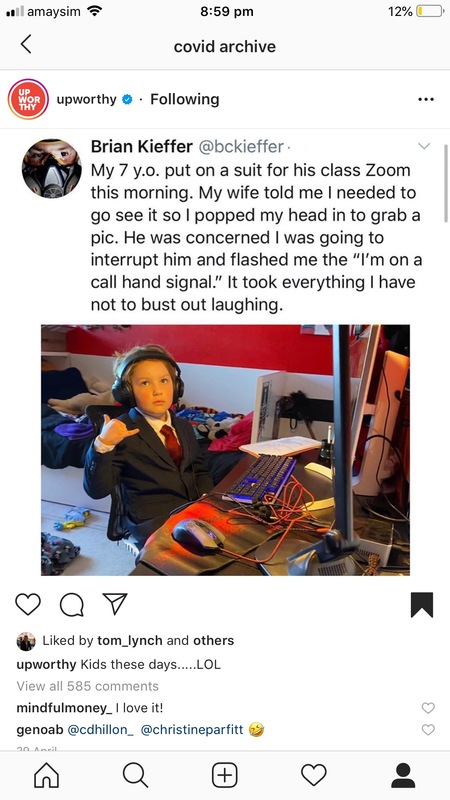 2020-04-30
2020-04-30(HIST30060) Zoom University
(HIST30060) As a result of Victoria going into lockdown, classes at University of Melbourne went online, with lectures and tutorials being delivered via Zoom. Through both semesters, many technical and other issues have occurred as we've all learned how to use Zoom and gotten used to online learning. This post reflects what I'm sure many people experienced while on a Zoom call; for me, it was my mother walking in on my countless times, forgetting when I would have class, while she also worked at home, and both of us wearing something nice and presentable on top with our athletic/leisure wear out of shot. -
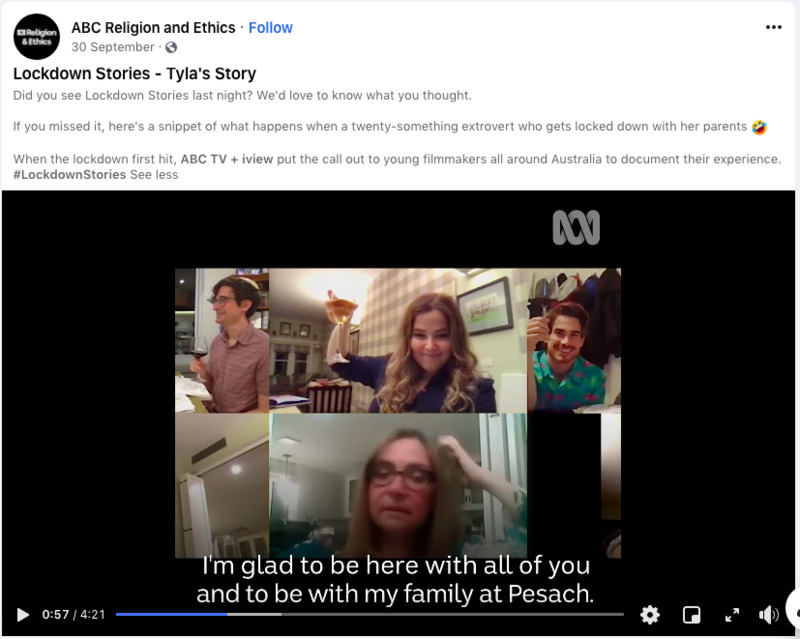 2020-09-30
2020-09-30Jewish Melbourne: ABC Religion and Ethics - Tyla's Story
ABC's Religion and Ethics program created a video series 'Lockdown Stories', inviting people to submit their videos and stories. On 30 September they shared on Facebook 'Tyla's Story': a film made by Tyla about being locked down at home with her family, conducting Pesach via zoom, having family shabbat dinners on zoom and then reuniting with her siblings for shabbat once the lockdown lifted. -
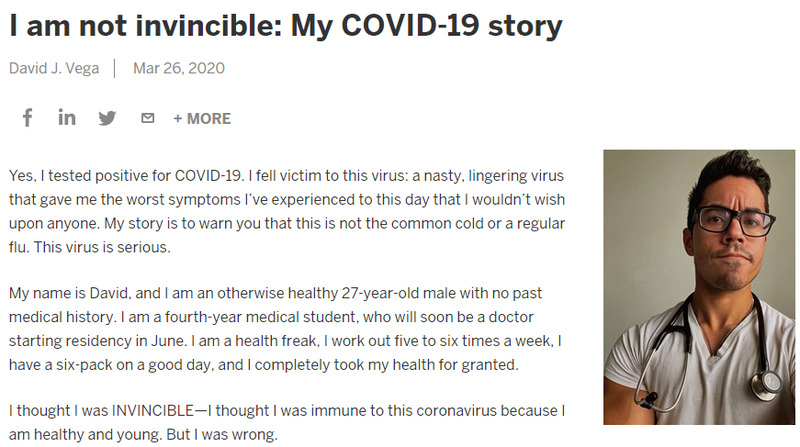 2020-03-26
2020-03-26Medical Student's Experience with COVID-19
This is a blog post from a fourth year medical student at Indiana University’s School of Medicine. According to the article, he had taken the precautions he thought were necessary in order to remain COVID free, but it really isn’t certain that no matter all the precautions you take that you won’t get it. It addresses the thoughts that younger citizens are less likely to contract the virus, and don’t expect it to happen to them. It pleads for people to be vigilant in their measures to remain COVID-free and to understand that it is a very real possibility. The author also discusses the dangers of the virus also presenting no symptoms in some who have contracted it. (Arizona State University, HST485) -
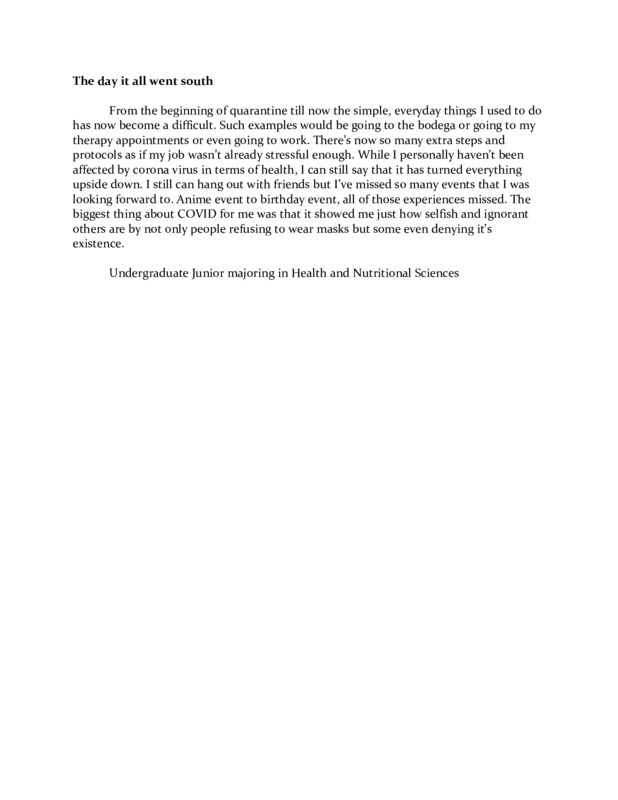 2020-03-26
2020-03-26The day it all went south
From the beginning of quarantine till now the simple, everyday things I used to do has now become a difficult. Such examples would be going to the bodega or going to my therapy appointments or even going to work. There’s now so many extra steps and protocols as if my job wasn’t already stressful enough. While I personally haven’t been affected by corona virus in terms of health, I can still say that it has turned everything upside down. I still can hang out with friends but I’ve missed so many events that I was looking forward to. Anime event to birthday event, all of those experiences missed. The biggest thing about COVID for me was that it showed me just how selfish and ignorant others are by not only people refusing to wear masks but some even denying it’s existence. -
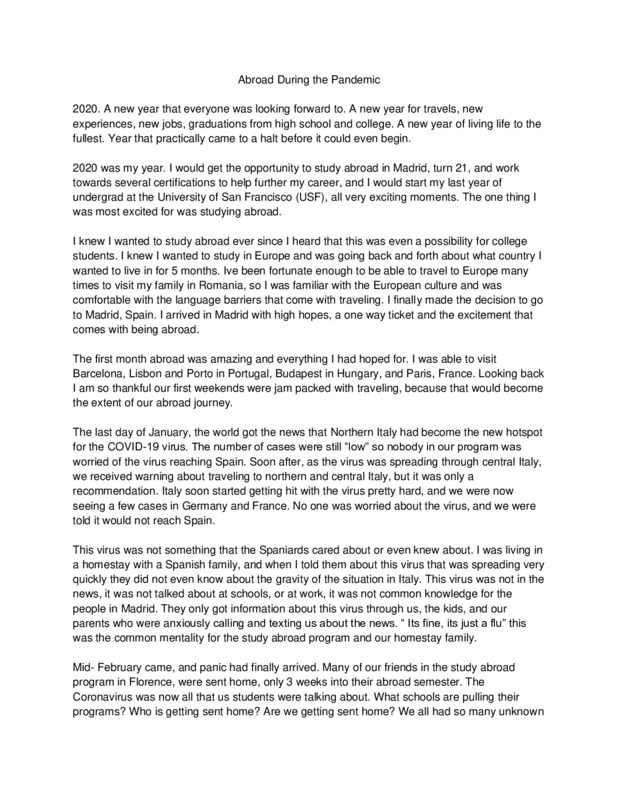 2020-07-30
2020-07-30Abroad During a Pandemic
I have decided to share my study abroad experience and how people were really not expecting a pandemic and what was done as a result of the spread. -
 2020-05-15
2020-05-15Student Paper on Federalism and Coronavirus
A student's paper discussing how federalism has influenced how the United States has responded to the pandemic. -
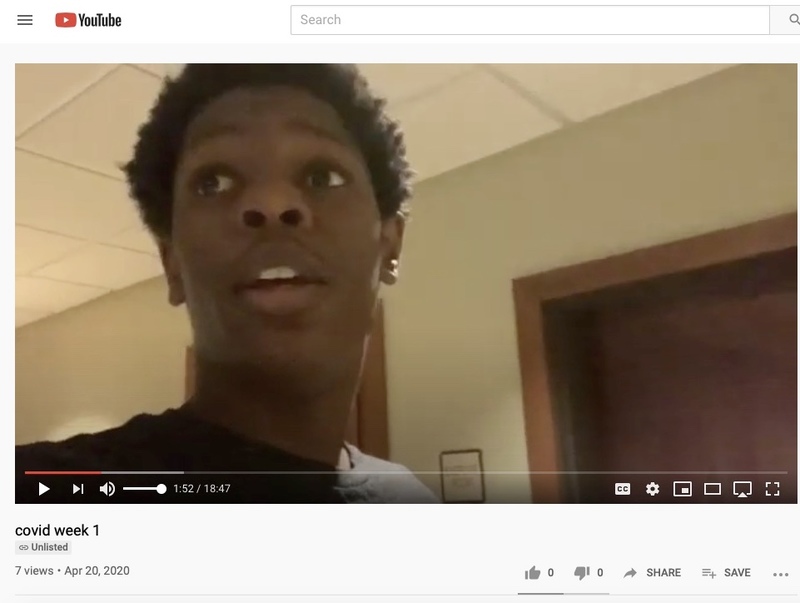 2020-05-13
2020-05-13One week of my personal Covid-19 experiences.
I decided to pick up a camera and record daily diaries about things I found out Covid-19 or how it has affected me. *Original Video -
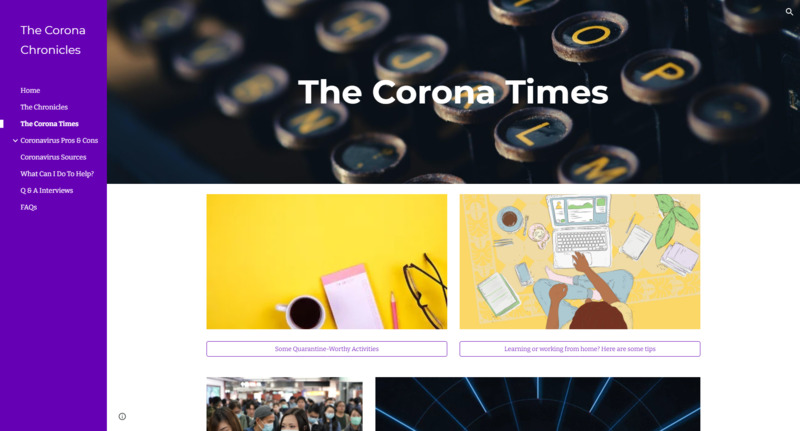 2020-03-23
2020-03-23The Corona Chronicles
This is a Google Sites website that I made about the coronavirus with my experiences, feelings, thoughts, information on Covid-19, and interviews. It was originally a school project, however I have expanded on it much more since. -
2020-03
Extraordinary Times: A COVID-19 Visual Journal
A visual diary of life with a young child during the COVID-19 pandemic and mandated social distancing in greater Boston, starting in mid-March 2020. It's updated twice a week, sometimes more if the situation demands it, or if I feel the need. It's drawn with pencil and watercolors. This visual journal is my way of recording and coping with these extraordinary times. -
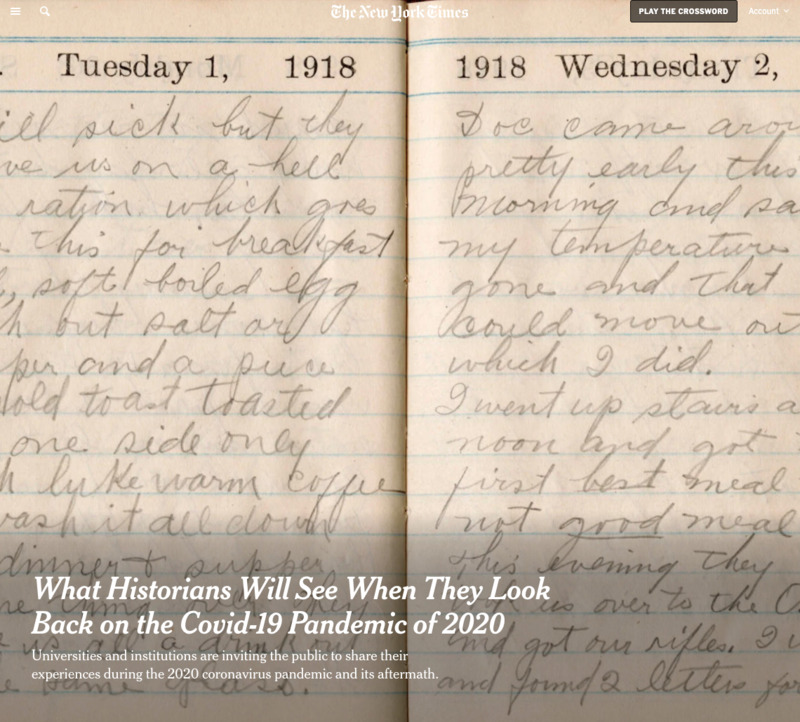 2020-04-15
2020-04-15NYT Story on the COVID 19 Archive
Sherri Denney was in the fourth day of quarantine in her home in Springboro, Ohio, when she thought about the toll the coronavirus was taking. She sat in her recliner chair and cried as the state’s governor checked off the number of dead and sickened, knowing there would be more the next day. Overwhelmed, Ms. Denney, 55, tried to put her feelings into words. “Wow,” she began writing on an old sketch pad, quickly realizing the precise words would not come easy. “That’s all I can say. My emotions are ranging from sadness to fear to anger.” The week before, a woman in Nevada turned to her own version of journaling. Mimi J. Premo recorded a video on her cellphone, giving voice to a kind of stunned weariness so many Americans are feeling. And in Indianapolis, in an interview recorded by two university research assistants, a man who is diabetic and H.I.V. positive talked about how the speed and unclear ways of transmission “freaks me out.” The three accounts, snapshots of intimate moments during the pandemic, are a response to a call from historians and archivists across the country to document this extraordinary moment in history. Universities, archives and historical societies, ranging from the Smithsonian’s National Museum of American History to a tiny college radio station in Pennsylvania, are rushing to collect and curate the personal accounts of how people are experiencing this sprawling public health crisis as told in letters and journals, audio and video oral histories, and on social media. They are inviting people such as Ms. Denney and Ms. Premo to share stories and material from the 2020 coronavirus and its aftermath in real time. The idea is to bridge communal history and offer a fully realized look at the outbreak that can help the public, researchers and policymakers better understand how the pandemic permeated our lives. ImageA journal entry by Sherri Denney. It was one of the first submissions to the coronavirus public memory project set up by Wright State University. A journal entry by Sherri Denney. It was one of the first submissions to the coronavirus public memory project set up by Wright State University.Credit...Wright State University Whether a somber handwritten journal or an endearing Instagram post, the contributions will offer a look at a nation attacked by a virus coast to coast. The stories document sickness and death. The profound disruption of American rhythms and rituals, evidenced by empty shelves and streets. The gnawing restlessness of sheltering in place. The ways people showed resilience and managed to still find joy. “What we as contributors record is what the future generations will remember,” said Mark Tebeau, one of the project directors of a virtual archive founded at Arizona State University. The team of historians and artists started A Journal of the Plague Year: An Archive of Covid-19 on March 13, two days after the World Health Organization declared the coronavirus a pandemic. The name was inspired by Daniel Defoe’s novel “A Journal of the Plague Year,” which chronicles the bubonic plague in 1665 London through the lens of one man. Latest Updates: Coronavirus Outbreak in the U.S. The California State University system will not hold classes on campuses this fall. Top health experts testify that the U.S. is not ‘out of the woods’ and warn against reopening too fast. Testing becomes a flash point in the Senate hearing. See more updates Updated 9m ago More live coverage: Global Markets New York With the help of graduate students and scholars from about 20 universities, the archive has amassed more than 1,400 entries from 500 contributors across the world, including Australia, Peru and China. Mr. Tebeau, a public and digital historian who heads the university’s public history program, said they are also reaching out to marginalized communities to ensure the project is inclusive. One of the first entries came from Ms. Premo, 36, a customer service representative who lives near Las Vegas. She had not left her home for nearly a week in mid-March when she submitted the video. In the clip, just over two minutes, she wonders who might be stricken with Covid-19 next. A neighbor? A friend? A family member? “No matter how many Skype meetings I have, no matter how much I am on Facebook, no matter how much I write in my journal and try to laugh through the tears, it feels so different,” Ms. Premo said. “Living with this uncertainty is,” she added, pausing in the video, “it’s unsettling but I feel that no matter what happens, I guess it’s hope that keeps my spirits up.” Video Mimi J. Premo shared her thoughts in a video diary to Arizona State University. Last week, the Library of Congress received its first Covid-19 collection: street scenes from New York, New Jersey and California by the photographer Camilo Jose Vergara. In addition to documenting stay-at-home life, mask styles, health care workers, the economic impact and how people are helping one another. The Library of Congress is also collecting web content, data and maps. The Smithsonian’s National Museum of American History deployed a Rapid Response Collecting Task Force to chronicle the pandemic. “Museum staff is working to formulate a plan that achieves a balance between the urgency to document the ephemeral aspects of the historic turning points as they happen,” the museum said in a statement, “and the need to provide a long-term historical perspective.” In response to the pandemic shutdown, StoryCorps, the story-sharing nonprofit, moved its platform online for the first time. Interviews that used to be recorded in a physical studio can now be done using video conference technology. The audio and a photo from each interview will be preserved in the StoryCorps Archive and with the Library of Congress. And students at Neumann University in Pennsylvania set up a series called the Coronavirus Diaries on the school’s radio station, WNUW-FM. Listeners record themselves sharing pandemic stories using a voice memo app or by leaving a phone message at the station. The diaries air hourly. Local archives are also calling for oral histories and materials. The Atlanta History Center, for example, is asking the city’s residents for digital files and physical artifacts (the latter would be collected once the center reopens). The project, called Corona Collective, lays out how seemingly mundane items — a no-frills furlough notice, a handmade banner thanking emergency medical workers — help tell the story of how daily life in Atlanta changed. Image “Goodbye,” a drawing submitted to “A Journal of the Plague Year,” an archive of the coronavirus pandemic created by Arizona State University. “Goodbye,” a drawing submitted to “A Journal of the Plague Year,” an archive of the coronavirus pandemic created by Arizona State University.Credit...Jeffrey M. Davis Similar efforts are cropping up in big cities and small towns. Sometime during spring break in March, Jason Kelly, a professor at the Indianapolis campus of Indiana University, realized the coronavirus was likely to be the defining event for generations. For a professor who teaches digital public history, it meant something else, too: How people experienced the outbreak needed to be captured and organized in a searchable database. That was the seed of what is now the Covid-19 Oral History Project, based at the Arts and Humanities Institute on the Indianapolis campus. Mr. Kelly turned to the 19 graduate students in his digital public history class and asked if they would put other coursework on hold to focus on the project, which uses “rapid response collecting” for Covid-19 lived experiences. Eventually the project will merge with the larger Plague archive Such efforts to collect memories in real time was also used by groups after the Sept. 11 attacks, Hurricane Katrina and the Pulse nightclub massacre. The page from Ms. Denney’s diary became one of the first submissions to the coronavirus public memory project set up by Wright State University. “All of a sudden the pandemic was right here and personal,” said Dawne Dewey, head of special collections and archives at the university. “We put the call out because we need stories to help future generations understand this moment in history.” The archive, partly housed on the fourth floor of the school library, includes the journals of survivors of the 1918 flu pandemic. One was written by Donald McKinney Wallace, a farmer who served in the Army. Mr. McKinney was sickened with the flu in the fall of 1918. He was quarantined in barracks, separated from others by blankets hung from a wire. He wrote about the daily meal of soft boiled eggs and cold toast, feeling weak, a stubborn fever, isolation and the deaths of fellow soldiers — an account that could have been written today. “A century ago, people told their stories in written journals,” said Ms. Dewey. “Now, we are capturing people’s thoughts and experiences through social media posts, email, audio and photographs.” -
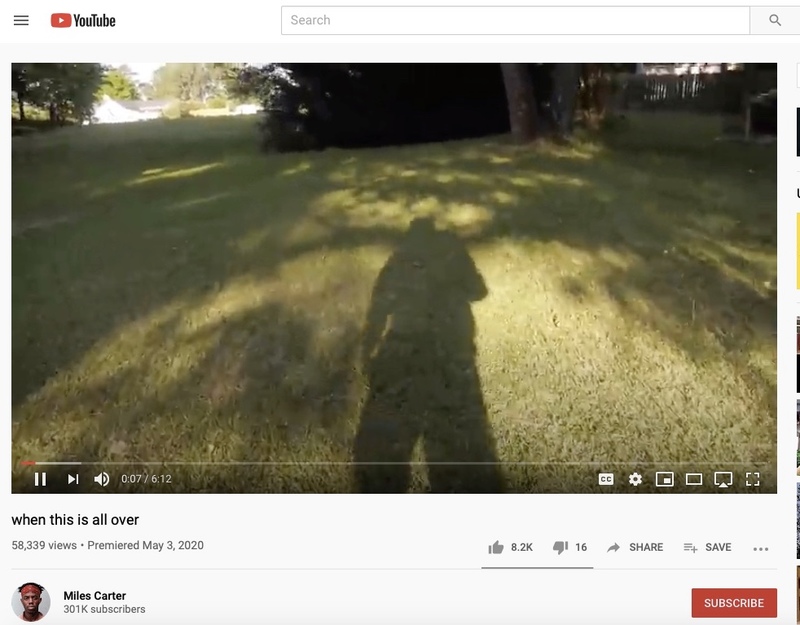 2020-05-03
2020-05-03When This is Over
Youtube motivational speaker that provides a positive outlook pertaining to what is going on in the world and how to move on in a healthy way. -
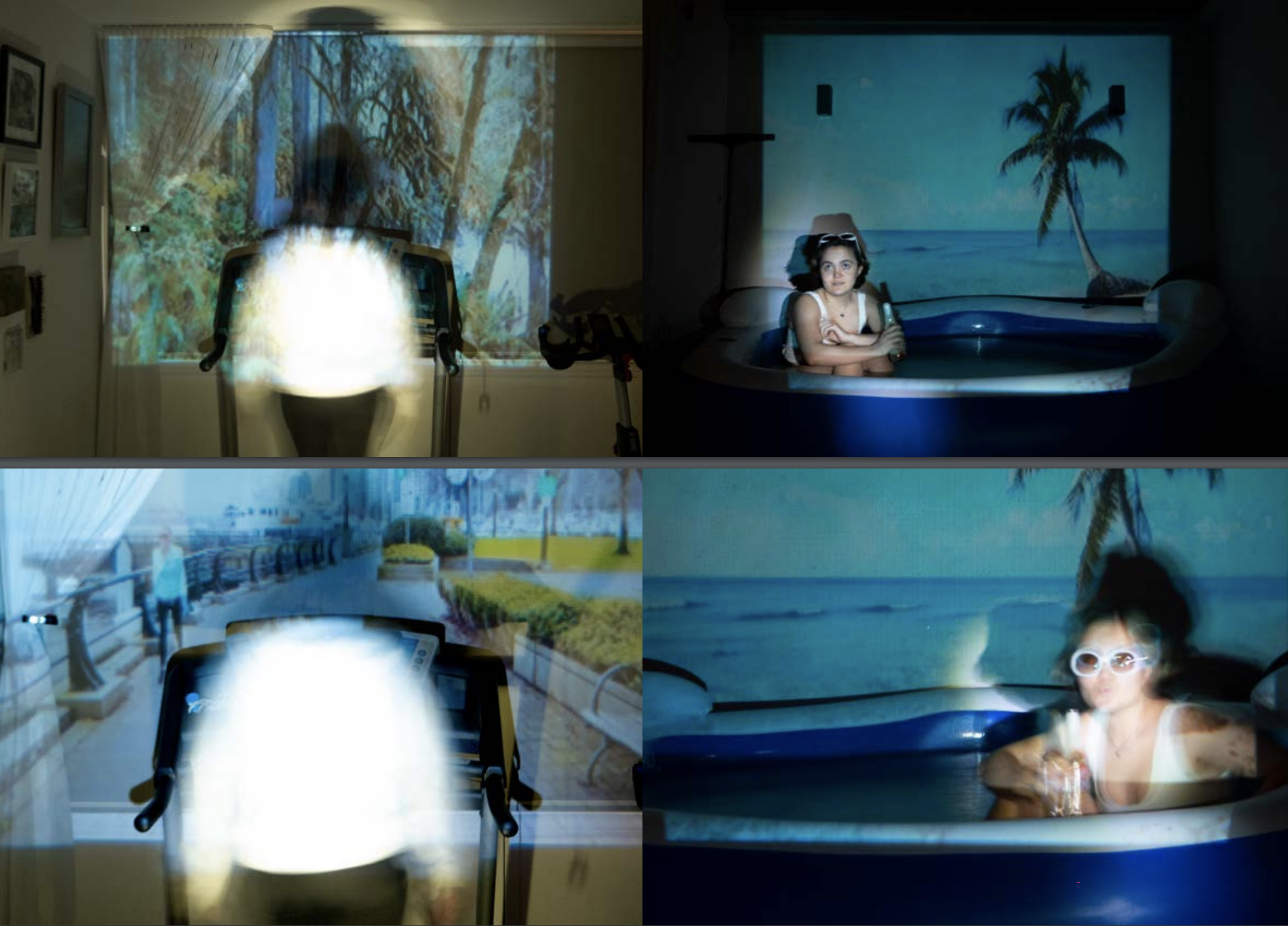 2020-04-15
2020-04-15Experiencing the outide from inside
The idea was to show my attempt at bringing some of the things I missed from the outside world to the inside of my house. It is meant to be ironic and sort of comedic as it is obviosly kind of impossible for me to bring the beach or to go on a walk around the city inside of my house but it shows the reality of the right now. It was an assignment from my class at Parsons, PUFY 1001, A09 with Professor Jensen -
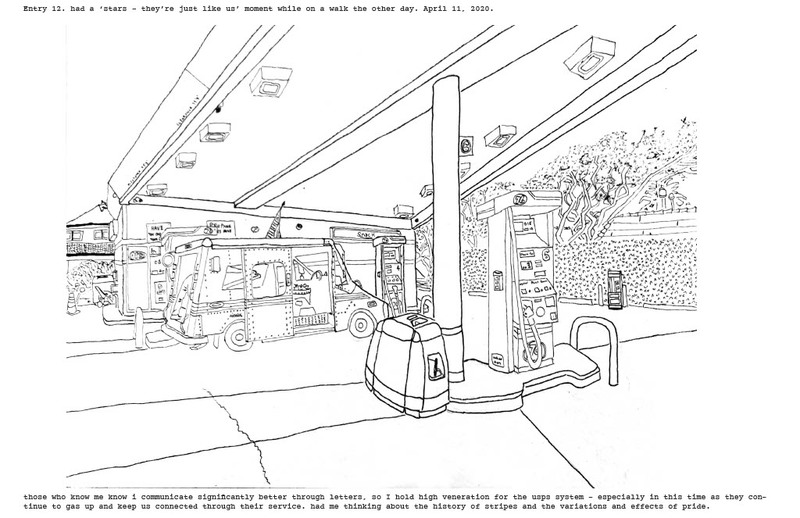 2020-04-19
2020-04-19The Covid Diaries Entry #12
My experiences of this pandemic.Entry 12. had a ‘stars - they’re just like us’ moment while on a walk the other day. April 11, 2020. those who know me know i communicate significantly better through letters, so I hold high veneration for the usps system - especially in this time as they con- tinue to gas up and keep us connected through their service. had me thinking about the history of stripes and the variations and effects of pride. Since Corona inception to current -
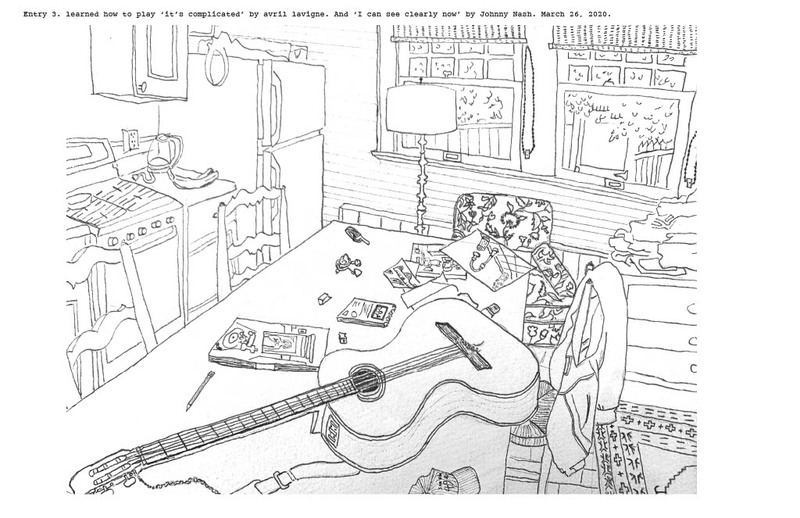 2020-03-26
2020-03-26The Covid Diaries Entry #3
My experiences of this pandemic.Entry 3. learned how to play ‘it’s complicated’ by avril lavigne. And ‘I can see clearly now’ by Johnny Nash. March 26, 2020. -
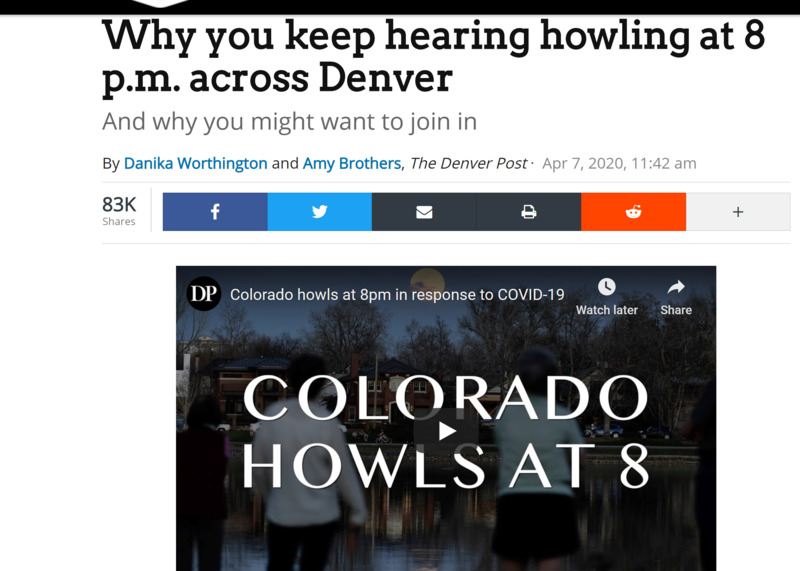 2020-04-07
2020-04-07Denver howling
News report about nightly howling in Colorado -
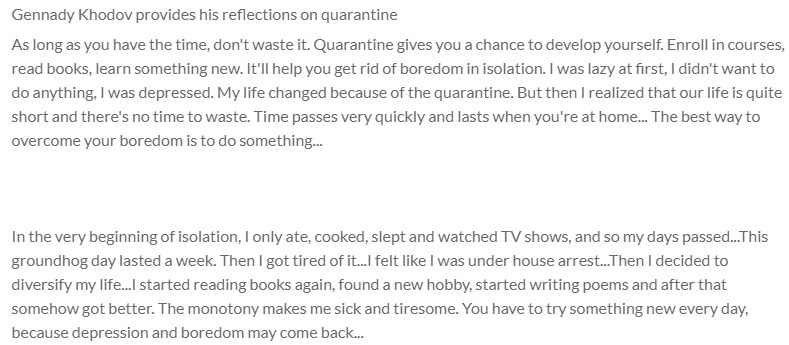 2020-04-26
2020-04-26My Isolation
Gennady Khodov provides his reflections on quarantine -
 2020-03-24
2020-03-24COVID 19 Journal
COVID 19 Journal by Kaitlin Whalen written 03/24/2020-04/24/2020. -
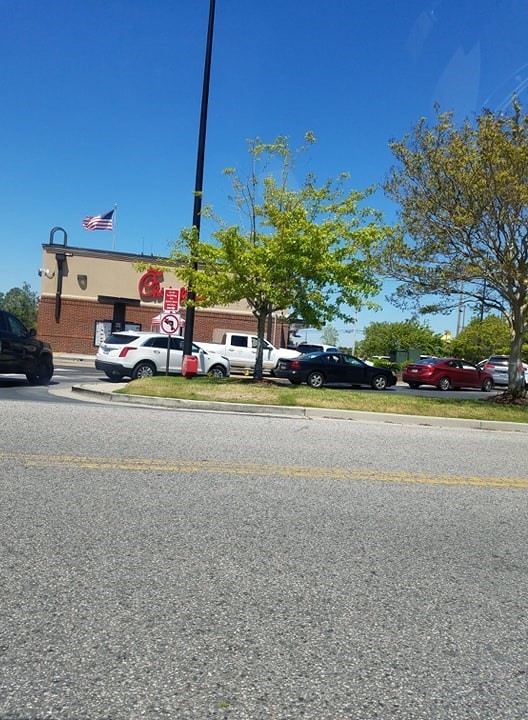 2020-04-18
2020-04-18Learning Patience at Lunch
This is a picture of the Chick-fil-a drive-thru in North Myrtle Beach, South Carolina. In an effort to abide by social distancing rules, I avoided going out to public places for the past two weeks but needed a small reprieve from isolation and went to get lunch on April 18, 2020. While the restaurant is usually very busy, I had never seen it this busy. The line wrapped around the building and out into the road into the turning lane leading to their parking lot. Although I am not a traditionally patient person, I realized that everyone was going through a similar experience and we were all in search or some sense of normalcy, or at least a chicken sandwich. I learned to be patient that day and appreciate the fact that Chick-fil-a was open when many places are not. Patience is something I think we have all learned in this process and I found it ironic that a fast food restaurant could teach me something I have struggled with almost thirty years. Taking the time to be appreciative of what we do have is far less exhausting than focusing on what we are without. -
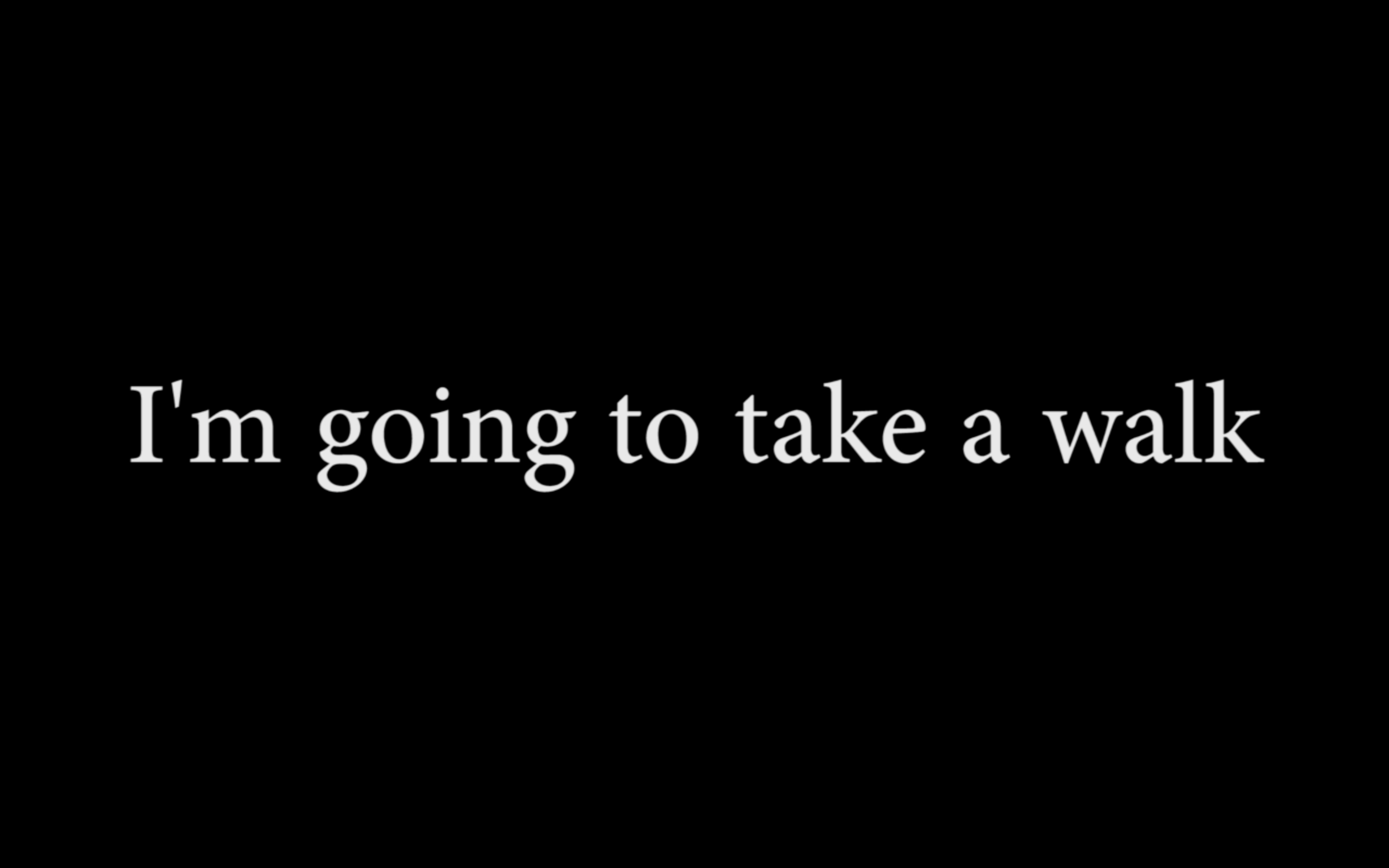 2020-04-13
2020-04-13I'm going to take a walk
This is a video of my personal experience of the Pandemic. -
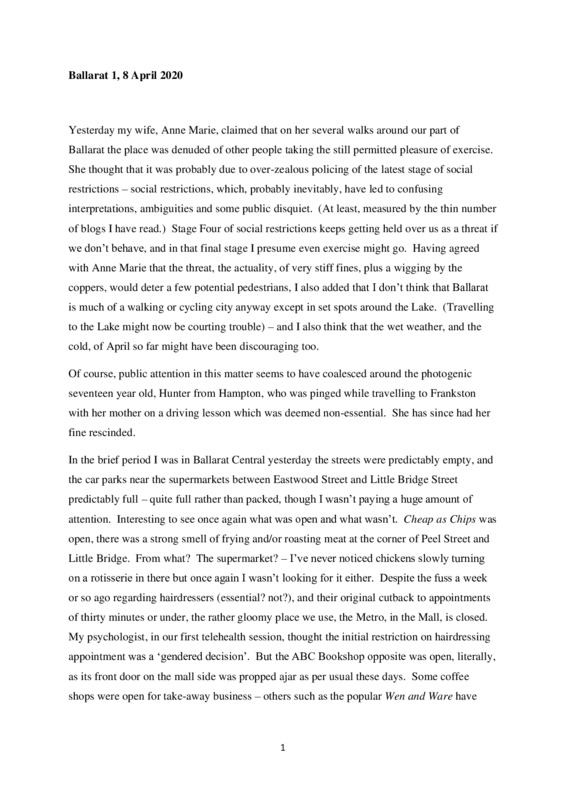 2020-04-08
2020-04-08Ballarat COVID-19 Report Number One
Personal observation of lockdown in a regional Australian city
